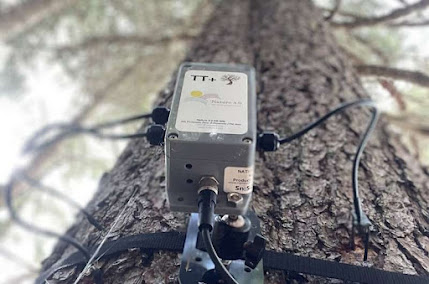Trees Synchronize Their Bio-electrical Signals During Solar Eclipses: 'The Wood Wide Web in Action'
Title: Trees Synchronize Their Bio-electrical Signals During Solar Eclipses: 'The Wood Wide Web in Action'
Date of publication: May 26/2025
Author: Andy Corbley
Summary of Article: Recently, more evidence has arrived from the Dolomites, which is furthering the belief that trees display group cognition and communication. In the Dolomites a multidisciplinary team, comprising of experts from Spain, Italy, Australia, and the United Kingdom, monitored and observed a forest during a solar eclipse. The researchers witnessed two things: "that trees of the forest synchronized bioelectrical activity during the eclipse," and incredibly, "the process of synchronization was started and directed by the eldest of trees." This process, conducted by the elder tree, began a full fourteen-hours before the eclipse event even started.
The results from the multidisciplinary team was published in Royal Society Open Science, and their findings demonstrate how seriously important and valuable the old trees are to the forests in which they live. The results also give us an insight to how much "our woody cousins respond to their environment."
The team used low powered sensors that they custom built and placed across the Dolomites forest to record bioelectrical responses from a multitude of trees that was simultaneous. They monitored charged molecules (an electrical activity) known as an electrome, and they travel through all living organisms. The scientists observed this phenomenon during the hour-long eclipse. These bioelectrical signals are currently the only known way trees communicate and interact with their environment as well as with each other in a manner that resembles dialogue.
By applying their advanced analytical knowledge of quantum field theory and complexity measures, they were able to uncover a deeper understanding in the dynamic of the trees synchronization. They've discovered that the "dynamic synchronization [was] not based on matter exchanges among trees," which means that this is the closest we've come to witnessing trees utilize something similar to discourse.
There is so much that we don't know, and the fact that all the trees are able to communicate among each other through their roots seems like an unfathomable concept, and I love it. Knowing that trees have a sense of connection with on another, along with the fact the the elder trees are the one that begin this whole process, makes me think about and consider all of the other things plant and (supposed) non-sentient organisms are capable of. We truly at this point in time don't fully know, and that is what makes this subject beyond interesting.
I've always thought of plants as organisms that feel, think and experience life in some similar ways that humans do, and I am truly looking forward to more research on this topic. I'm excited to see what we are going further discover, and I don't mean just trees, I mean micellar networks, fungi's, and other species of Plantae.





Comments
Post a Comment